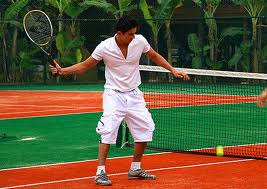Goalset tennis for strong progress
Where did the goalset idea come from? When I did the classes for my most important coaching certificate, the USPTR, I was amazed about the stress put on the “Set your Goals!” phase of any activity. I came across this again later when I passed a university teaching exam. Why didn’t I see this at school or at university?
Are you in an achieving culture?
School is very much a human interaction environment. It was for me anyway. That means I became socialized, integrated and organized through a structure created by my fellow humans. The fact that you learn things about moreorless important subjects, or that you gain qualifications to improve your later life choices, was mentioned very little. It was understood.

Does education and tennis mix?
Surely at school we have goals too? I can only say that, deliberately or not, the school had indeed set goals, and through their strong social structure, the goals became integral, obvious, and unvariable for our institution. So strong was this goal-setting that we never even had to talk about them. I hope that you went to a school like this, a school with a reputation to defend, with a clear hierarchy, with rigorously-enforced rules.
Or maybe you went to a school permanently on the move spiritually and structurally, not sure of its past, nor its future, and with rules and hierarchy that were contested by all participants. I have had a lot of contact with schools in France in recent years, and this is how state schooling, possibly in many countries, has become. What is interesting is that there is a enormous amount of “goal-setting’ in these modern schools, in fact there is a “bible”, a list of thirty goals for the school, largely inter-relational.
I’ll take an example from my local state school here in France. One is that in this school, an objective is total respect between pupils, between teachers and pupils, between administrative and ancillary staff and pupils. This sounds like an honourable goal, but I didn’t need it, or have it, in my school. We weren’t told to respect each other, or to respect the staff. The goalset is in place, and it is an answer to an identified weakness in the existing structure.
So, in the modern school pupils are told to respect each other, in my old-fashioned school, we weren’t. Now for the biggest irony of all. In the modern school nobody respects anybody, in the old-fashioned school everyone respects each other. I know which type of organization I prefer to work and live in.
Where does respect come from?
Our thoughts here are with goal-setting as a fundamental human discipline. A necessary step. Through my example it seems that a goal is set when the structures around you don’t deliver the goal, indirectly or inherently. So that goal has to be identified and strived for.
Let’s get back to our tennis player with a perfectible forehand cross court, who wants a nice achievable goal. Instead of the coach saying, we’re going to hit forehand cross-courts for the next week, he’ll say, “ In every session this week we’re going to hit twenty topspin forehand cross-courts, in a row.” That’s a workable, simple goal. You’d think that a tennis player would be able to set these goals himself, without a coach having to lay it out for him, net.
A drill.
Taking logic I used from my example at school, if a person from outside needs to set the goals, that means that the player himself cannot, or won’t, do it. Just think, a player could live without a coach if he were able to set his own goals, big and small. Or, he might be able to live without a coach, if the structures he moved in delivered these goals “automatically”.
My coaches' trainer course with USPTR insisted on goal-setting. It surprised me, slightly irritated me, because I knew about giving myself routines. I knew about getting jobs done, and not being satisfied until that job was done, until that goal was achieved. I found it rather like an annoying advertising jingle that you can’t get out of your mind. I had learned very quickly to respect the USPTR structures delivered to me, so I was ready to listen to their goal-setting ethos.
Now that the USPTR is long behind me, over twenty years in fact, I have had opportunity to work through this ethos, both on and off the tennis court. Now I know why we set goals, even when they seem obvious, and inbuilt to any system.

USPTR ethos
Our coach is not living in a short-term world. He wants to build strong, improving players. The timing and type of their progress is critical. His player had, for example, a deficiency with forehand cross court. Give him a simple goal, achieve it, and move on. The player will respect you. The player will respect himself.
The coach is in charge. The player must trust the coach for any progress to be made. If the player wants to suggest his own goals, he should feel free to communicate this to the coach. If they don’t agree, then there is a serious danger that these two will be wasting their time on the court.
A good coach sets a goal for every player he works with. It isn’t because the player won’t or cannot do it, it’s because the coach can do it better, and he is being paid because he can do it better. With time a player will become better at setting his own goals, and disciplining himself to achieve these goals in a fixed time. However, the coach will always be doing it better than him. He has an outside view. It’s the coach’s job.

The right tennis coach?
We goalset because the alternative is horrible. Our lives meander into meaningless, directionless, long walks. We goalset because our future is NOT obvious. We need to invent it, we need to organise it.
With goalsets we advance in strong clear steps. We see what we do well and not so well. We discover ourselves, in our environment, totally. We become immensely efficient with our time and effort.
The ultimate goal - winning.

